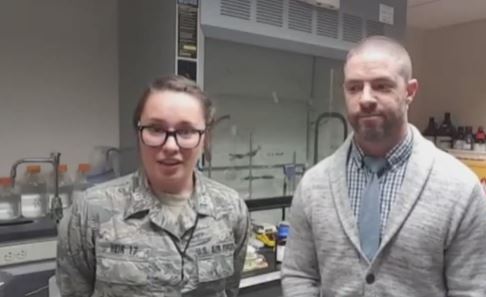Senior Hayley Weir is set to graduate at the end of May and just finished up a capstone project. But she already has solid plans after graduation - because of a new material she created.
It's been tested - and can stop a 9 mm round and a 44-magnum round. It's already patent-pending. And could, ideally, be used as protective lining for military service members.
“It was really kind of like making a cake, as opposed to exact science,” Weir said.
The material weighs less than half a pound when it’s put together. It is 8 millimeters thick.
“Really, it doesn’t look like much,” she said. “But when you shoot it, it’s awesome.”
You don’t have to just take her word for it, though. Just take a look at the test footage from the Air Force, showing this material in action:
The material was made in a KitchenAid mixer - using plastic knives. That part sounds simple, but it was a lot more than just mixing a few things together.
While the material could be used as body armor, Weir said it could also be used for tents and vehicle casing.
The material is “not new science, but is innovative,” said Weir’s advisor Dr. Ryan Burke. They’ve taken and layered what they know can stop a bullet, and added new things “in a novel way.”
What sparked Weir's interest in chemistry and such materials was a lab in one of her courses, where the class was told to see if they could take provided materials and combine them into something that would stop a bullet.
“I thought that was the coolest thing ever,” she said.
Researchers from the Air Force Civil Engineer Center have taken over the development of the material, a news release said. The research team hopes to improve it to where it can withstand rifle rounds and other heavy-duty ballistics.
Weir received a full-ride scholarship to study in a graduate program at Clemson University, after graduating from the United States Air Force Academy at the end of the month. She'll study material science and engineering.


